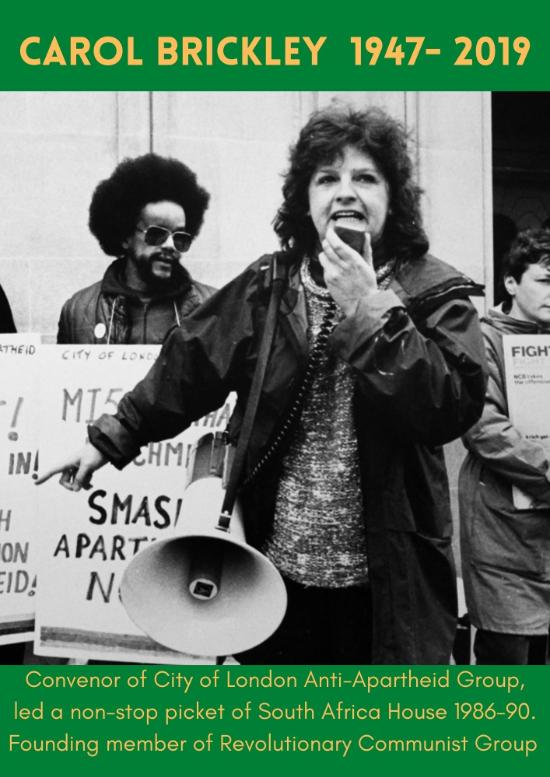Dolours Price 1951-2013, Marian Price, 1954-
Born into a Republican family in Belfast, sisters Dolours and Marian Price took up the fight against anti-Catholic discrimination and the occupying forces of British imperialism. In 1968 Dolours joined the student-based socialist group People’s Democracy, demanding one person one vote in local government elections; action on unemployment and housing and an end to the administrative policy of systematic discrimination against the Catholic minority.
On 1 January 1969 both Dolours and Marian Price were among the 80 people who participated in the three-day march from Belfast to Derry demanding civil rights. The march was opposed by the main Northern Ireland Civil Rights Association, which had agreed to call a truce with their Stormont masters. On 4 January, as the march approached Derry they were attacked by more than 200 loyalist thugs. It would later emerge that the RUC (police) had assisted the attack; over 100 of the attackers were members of the locally-recruited British Army reserve known as the B-Specials. Dolours was beaten into the river at Burntollet by the loyalist mob and almost drowned. The marchers, many injured, reached the nationalist Bogside at 2am next morning as drunken RUC men ran amok breaking down doors and attacking anyone in sight.
The barricades went up to prevent further incursions; Free Derry was born. The civil rights struggle would intensify into the revolutionary national struggle. The civil rights movement split between constitutional reformers and revolutionaries as the British Army moved in to occupy the north of Ireland. Dolours and Marian Price became revolutionaries.
After the introduction of internment (detention without trial) in August 1971, Dolours and Marian joined the Provisional Irish Republican Army and in 1973 they were both selected, along with eight others, to form an Active Service Unit (ASU) to take part in the first Provisional IRA bombing campaign in Britain.
Later that year substantial car bombs exploded outside the Old Bailey and New Scotland Yard, the headquarters of the Metropolitan Police. Warnings were given and no fatalities occurred as a result. The ASU members were quickly captured as they attempted to leave London, and once incarcerated in Brixton Prison became known as the Belfast Ten. The British state quickly devised a dispersal strategy to prevent prison protests developing, but, prior to dispersal, the Belfast Ten commenced a hunger strike with the specific demand of repatriation to serve their sentence in an Irish prison as political prisoners. Dolours wrote: ‘We thought about it all the time we were in Brixton and we know what Terence MacSwiney suffered there. How could we accept what he died resisting?’ On 19 November Dolours stated ‘We are not accepting criminal status…We are petitioning the Home Office to be returned to Armagh [Prison] or else given political status here’.
On 3 December 1973 Dolours would become the first woman IRA prisoner to be brutally force-fed. In the cell next door, her sister Marian was forced to hear the torture and violence. The sisters knew that the leader of the Irish Republican Brotherhood, Thomas Ashe, had been force-fed to death in Mountjoy Prison, Dublin in 1917.
The Price sisters detained in Brixton, along with fellow Irish prisoners Hugh Feeney in Gartree and Gerry Kelly in Wormwood Scrubs, endured 206 days of hunger strike – a duration sustained by the regular bouts of force-feeding. This was halted only when IRA volunteer Michael Gaughan died due to force-feeding on 3 June 1974. On 7 June all four prisoners ended their hunger strike after an agreement to transfer them to Irish prisons was reached. When the Labour Home Secretary Roy Jenkins reneged on the deal, both Marian and Dolours commenced a second hunger strike on 29 November 1974. The IRA leadership opposed the second hunger strike. When transfer came on 15 December it was not to an Irish prison but to Durham. On 18 March 1975, as part of a truce struck between the IRA leadership and the British government, the Price sisters were transferred to Armagh women’s prison and granted political status having endured years of brutality at the hands of a vindictive Labour government. The sisters were freed on humanitarian grounds in 1981.
As the Irish struggle faced a period of retreat and betrayal in the 1990s both Dolours and Marion opposed the Good Friday Agreement. Dolours contributed to the Blanket online journal of protest and dissent and in 2008, in a tribute to Brendan Hughes, she poured scorn on those former comrades who in her words ‘craved power and money. Now they run the British Administration in the six northern counties for the enemy. Treachery beyond all anticipation.’
Marian Price was arrested on trumped up charges in 2011 and held in solitary confinement in Maghaberry prison. She was vindictively refused permission to attend her sister’s funeral in January 2013 and released in May 2013.





